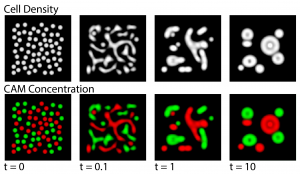
The rapidly expanding fields of Computational Biology, Bioinformatics, and Systems Biology are situated at the interface between biological, computational, and quantitative disciplines. It is now clear that computational and mathematical approaches are needed in order to fully understand complex biological processes. Such methods can extract relevant knowledge, unravel the underlying mechanisms, and predict the behavior of biological systems from the ever-growing biological experimental datasets. Computational biologists are already impacting science and developing new technology in many cutting-edge fields, such as pharmaceutical drug discovery, personalized medical informatics, and synthetic biology.
Research in Computational Biology, Bioinformatics, and Systems Biology requires the close collaboration between scientists working in this discipline and experimental biologists. The Department of Biological Sciences provides a compelling setting for multidisciplinary research, hosting under the same roof wet labs studying a large variety of biological problems and model organisms and computational labs. Students in the Computational Biology, Bioinformatics, and Systems Biology (CBS) area of specialization thus receive advance training – and perform research in Computational Biology, Bioinformatics, and Systems Biology while still benefiting from interactions and collaborations with their experimentalist colleagues. In addition to carrying out thesis research with one of the faculty members listed below, CBS students will choose three or more courses from the following list.
Courses offered
- Bacterial Physiology (BIOL 611)
- Microbial Systems and Synthetic Biology (BIOL 612)
- Eukaryotic Genetics and Molecular Biology (BIOL 614)
- Systems Biology (BIOL 615)
- Human Molecular Biology (BIOL 618)
- Computer Applications in Molecular Biology (BIOL 628)
- Microbial Molecular Genetics (BIOL 634)
- Introduction to Developmental Biology (BIOL 642)
- Topics in Advanced Developmental Biology (BIOL 643)
- Development and Cancer (BIOL 644)
- Signal Transduction (BIOL 645)
- Plant Molecular Biology (BIOL 656)
- Theoretical and Quantitative Biology (BIOL 663)
- Population and Quantitative Genetics (BIOL 666)
- Advanced Topics in Evolutionary Biology (BIOL 681)
- Genes to Genomes (BIOL 683)
- Genome Sciences (BIOL 686)
- Seminar in Bioinformatics (BIOL 695)
- Courses from other AOS
Faculty
Mauricio Bustos: Multi-agent and stochastic modeling
Ivan Erill: Computational transcriptional regulation
Jeffrey Gardner: Bioenergy and bioremediation
Maricel Kann: Bioinformatics proteomics
Jeff Leips: Genetic basis of aging
Daniel Lobo: Computational systems biology
Kevin Omland: Molecular phylogenies and population genetics
Michelle Starz-Gaiano: Regulation of cell motility